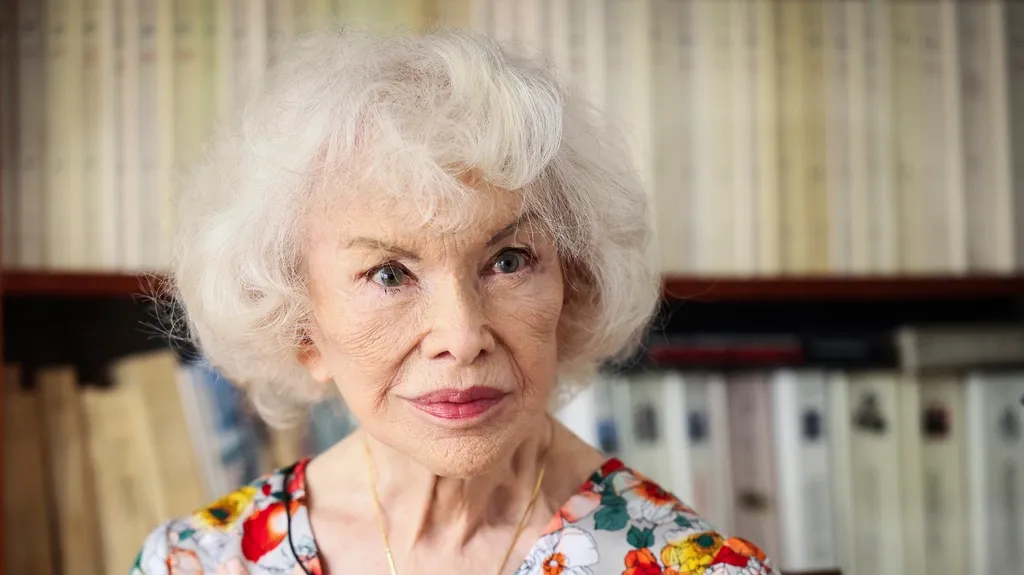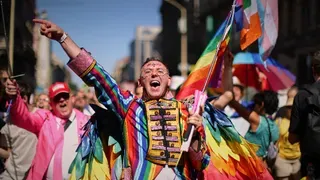January 5, 2011
A DADT Survivor :: Reichen Lehmkuhl's Story
Steve Weinstein READ TIME: 6 MIN.
In January of 1994, Cadet Reichen Lehmkuhl was pulled out of his bed at the U.S. Air Force Academy in the middle of the night by two of his fellow cadets who snuck into his room, and began to physically assault him-for being gay.
"These two cowards waited until my roommate was on a training trip," Lehmkuhl recalled. "They put a bag over my head and pulled me out of bed. They stripped my underwear off and they beat the shit out of me. While they were doing it, they told me why: It was because I was a 'faggot,' because they didn't want me there, and because 'the academy doesn't need a faggot in it.'
Now 36, Reichen Lehmkuhl would become second lieutenant, first lieutenant, and finally a captain in the Air Force. Back then, however, he had no one to confide in and no one to comfort him. Instead, he covered the bruises that covered his face and body, and kept the ordeal to himself.
"I couldn't go to a hospital, I couldn't go to a chaplin, I couldn't go to my commander, and I had no counselor to go to," he said. "So you basically cry into your pillow for two days, and try to find something to cover your bruises."
Lehmkuhl's story is not uncommon. In 2009, there were 428 discharges under "Don't Ask, Don't Tell" -- a significant drop from past years. Late last year, the government finally ended this discriminatory policy.
This is one airman's story.
Reichen Lehmkuhl had a number of elements in his upbringing that impelled him to become a skillful pilot. His grandmother was a pilot in World War II, one of the women who fought their way into the military. She "started flying me when I was nine-years-old and I became obsessed with flying," Lehmkuhl said. "I knew I was going to be an Air Force pilot and it's what I wanted to do."
His grandmother told him stories about her male colleagues who would get caught pouring sand in the women's training planes to get them to crash because they so desperately did not want women to serve in the Air Force with them. "She passed away as I was getting out of the military," Lehmkuhl explained, "but I know that she would be so proud of me."
The pressure of living under a shadow
Proud, he says, because of his dedication to the aid of ending DADT. On Reichen's Facebook page, before DADT's repeal, his activism -- along with supermodel-good-looks -- allowed him to amas a strong following.
He toured the country and spoke to businesses, schools and organizations about the implications of the policy and his own personal experience serving under its shadow. He spoke, for example, at Video Products Distributors, a Fortune 500 company whose CEO believed his employees could benefit from hearing Reichen's perspective on unfair employment discrimination.
Reichen served under the policy, in place for 17 years, for nine years, until he decided that he could no longer tolerate the burden of having to hide his true self and lie to his fellow soldiers about his sexuality. For heterosexual people, he noted, it might be difficult to understand the daily strain that comes along with a gay soldier having to conceal his or her identity from the people they are expected to trust the most.
"It wasn't just about not being able to say I was gay," Lehmkuhl said. "I had a partner at the time, and I couldn't ever talk about him." Fellow soldiers could talk about their wives and husbands.
"I never could bring my partner to their house," he added. "I always felt like something was missing, and I always felt left out, and I hated it. This policy mandated that I had to live this way, and it really broke down my moral, and it broke down our unit moral, because people thought that I was a snob, and that I didn't want to hang out with them. I loved these people, I loved the Air Force and I loved my job, but I couldn't stand the way the policy made me feel."
When he speaks, there is strength paired with softness in his tone. His masculine voice projects a delicate message of the emptiness and discomfort that came as a result of serving in silence. The small support Reichen had at the Academy was a secret group of gay and lesbian soldiers who confided in one another and occasionally found refuge in weekend houses away from the base.
"Sometimes we'd all get together at the same time, and sometimes we'd get together separately," Lehmkuhl said. "They were amazing: they were athletes, Rhodes Scholars, military dorks--people who loved all of the military stuff, and we all had our secret. We all knew about each other, and we got to know each other really well."
"It's stupid little lies," Lehmkuhl explained about the heaping up of half-truths necessary to get along. "You're lying about things that you would never think you would have to question your integrity on, like 'I met my partner's parents yesterday, it was so exciting.' You can't come into work and say that, but everyone else can. Honestly, who we date and how we live in our romantic lives is a big part of every person's life--- even a soldier's life. The majority of the time soldiers sit around in Afghanistan, they're talking about their partners at home, and they can't wait for the letters to come in."
Reichen, like many other gay-rights activists, says that DADT is reminiscent of the Salem Witch Trials and McCarthyism. He compares the outing of gay soldiers to pointing to someone and screaming 'witch' or 'communist.' Suddenly the accused person's life is subjected to intensive investigation, humiliation and isolation.
"We're removing them from their rooms in the middle of the night," Lehmkuhl described. "We're packing up their belongings in plastic like it's a crime scene investigation. Then we send them to an Air Force Academy hospital for mental testing to make sure they're not going to kill themselves, because now they know they are under investigation for being gay. They didn't tell anybody and nobody asked them, but somebody pointed at them and said that they're gay -- that's what 'Don't Ask, Don't Tell' didn't cover: the witch-hunt side. It's like McCarthyism, 'he's a communist, she's a communist' and they're on trial."
"There's a lot of shame involved," he added. "It's separation from the military, from your friends, from our support system, its embarrassment. It leads to suicide- -- it's that horrible. It leads to severe depression, taking away someone's spirit to even do anything. We're talking about doing this to a group of people who have taken on a profession that swears that I'll give my life for you. If I'm an active-duty person and my commander tells me to stand in front of you if a terrorist tries to shoot you, I have to stand in front of you and take the bullet, and that takes a really special person to take that oath."
Reichen argued that openly gay soldiers will not only be welcomed in the military, but loved by their units as well. He says he has no doubt that they might be made fun of or picked on occasionally, but compares it to the harmless ways he and his unit used to tease members of their unit.
"There were people in my unit who were a little bit overweight," he said. "Did we make fun of them? Yeah, behind their back and to their face. But did we dislike that person? No, we loved that person, and we would have done anything for that person. Then there was someone in the unit who walked a little light in their slippers, they were a little more feminine, did we make fun of that person and were there jokes in that? Yes, but did anyone hate that person? Absolutely not, because that person is going through 'the suck' [the day-to-day intensive training and duties associated with military life] with everybody else."
The irony lies in the fact that the United States Armed Forces already serve with openly gay soldiers when they fight alongside NATO allies. An overwhelming majority of countries allow gay and lesbian soldiers to serve openly, including Australia, Canada, Israel, Germany, Denmark and Great Britain.
In contrast, here are some of the countries that prohibit homosexual men and women to serve in the military: Iran, Iraq, Libya --�and until recently, the United States. Clearly, until the December repeal, there was a lot of irony in America's allies on this issue.
Steve Weinstein has been a regular correspondent for the International Herald Tribune, the Advocate, the Village Voice and Out. He has been covering the AIDS crisis since the early '80s, when he began his career. He is the author of "The Q Guide to Fire Island" (Alyson, 2007).






